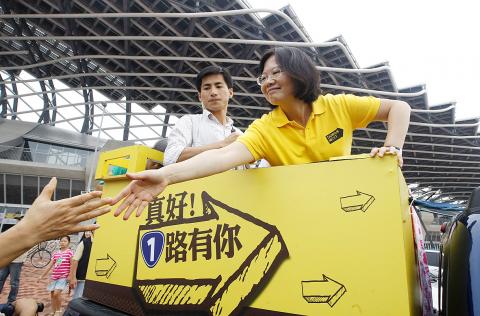|
Tsai affirms
recognition of the ROC
2011 CONSENSUS? The KMT under Ma and the DPP
under Tsai both agree that the ROC exists, but they each maintain different
interpretations as to what that entails
By Mo Yan-chih and Jake Chung / Staff Reporters, with CNA

Democratic Progressive Party
Chairperson Tsai Ing-wen, right, shakes hands with supporters after giving a
speech at the Kaohsiung World Games stadium yesterday.
Photo: CNA
Comments by Democratic Progressive Party (DPP)
Chairperson Tsai Ing-wen (蔡英文) on Saturday that were seen as affirming her
recognition of the Republic of China (ROC) drew mixed responses from the
government and members of the green camp.
Addressing a campaign event in Greater Kaohsiung, Tsai, a candidate in January’s
presidential election, said the ROC was Taiwan and Taiwan was the ROC, adding
that the ROC government today was no longer a foreign government.
Tsai said that in the past 62 years, the ROC only existed in Taiwan and had
blended with the land and its people.
“The majority of the people in Taiwan agree that Taiwan is the ROC and the ROC
is Taiwan,” she said.
Explaining Tsai’s remarks yesterday, DPP spokesman Chen Chi-mai (陳其邁) said they
did not signify a departure from the party’s previous stance on sovereignty, nor
were they timed to coincide with the ROC’s centennial celebrations.
Anyone who has studied the party’s platform in the past decade will know that
this view is consistent and logical, he said.
Tsai’s remarks prompted some soul-searching in the green camp.
“The DPP can say what it wants and we’ll say what we want, as long as we get
enough votes to win the election,” Taiwanese Society of International Law (TSIL)
secretary-general Lee Ming-chun (李明峻) said -yesterday. “We are absolutely
against the ROC, but it doesn’t matter that Tsai says that Taiwan is the ROC. We
believe in her and we can change that after we win the election.”
Tsai’s comments were also discussed at the ROC and Taiwan’s Historical Lessons
from the 1971 UN meeting hosted by the Taiwan National Alliance.
Chen Yi-shen (陳儀深), an associate researcher at the Institute of Modern History
at Academia Sinica, said Tsai was a candidate in the presidential election and
that elections “have their own language.”
Many are aware that the ROC and Taiwan are two faces of the same coin, Chen
said, adding that the ROC Tsai was talking about was different from the ROC
President Ma Ying-jeou (馬英九) referred to.
Ma’s ROC is one that overlaps with China, Chen said, adding that Tsai’s ROC was
an extension of the ROC from former presidents Lee Teng-hui (李登輝) and Chen
Shui-bian (陳水扁).
TSIL convener Yao Chia-wen (姚嘉文) said the presennt ROC referred to Taiwan proper
plus the islands of Kinmen, Penghu and Matsu rather than China in its entirety.
“An inappropriate name is a hassle and we need to promote the rectification our
nation’s name to the Republic of Taiwan,” Yao said.
The Presidential Office welcomed Tsai’s remarks, saying they affirmed her
recognition of the ROC, and called on her to attend today’s ROC centennial
ceremonies.
“Although Chairperson Tsai had a completely different interpretation on the
issue, we acknowledge her willingness to recognize the ROC,” Presidential Office
spokesman Fan Chiang Tai-chi (范姜泰基) said.
Fan Chiang said Tsai’s latest rhetoric was a deviation from her previous
description of the ROC government as “a government-in-exile,” adding that Tsai
should stop changing her position on the issue of national identity.
“[Recognizing the legitimacy of the ROC government] is what a presidential
candidate of the ROC should do and her latest comments reflect the opinion of
the majority of people in Taiwan. We expect her not to change her position
again,” he said.
|
![]()
![]()
![]()